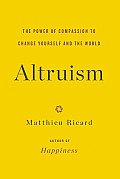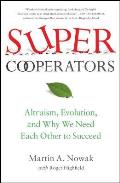
With the famous phrase "Nature, red in tooth and claw," the Victorian poet
Tennyson expressed the challenge that the emerging science of evolution posed to his faith in a universe ruled by love and compassion. Yet in today's science, all the in-depth studies show that violence has diminished continually over the past few centuries (as discussed by Steven Pinker in
The Better Angels of Our Nature: Why Violence Has Declined). Thus, despite the violence and conflict constantly emphasized by the media, our everyday existence is usually filled with cooperation, friendship, affection, and care.
Scientific investigation over the last 30 years has increasingly corrected the deformed view of human nature as motivated wholly by selfishness, a belief that long dominated Western psychology and theories of evolution and economics.
In the words of psychologist Daniel Batson, "The results of these experiments support the empathy-altruism hypothesis. None of the egoistic explanations proposed have received more than scattered support." Batson defines altruism as "a motivational state with the ultimate goal of increasing another's welfare."
I myself am deeply convinced that love and compassion — the two faces of altruism — are the cardinal virtues of human existence and the heart of the spiritual path. Loving-kindness is the wish that all beings experience happiness, while compassion focuses on eradicating their suffering.
I once asked His Holiness the Dalai Lama for some words of advice as I was about to enter a long meditation retreat in the mountains of Nepal. His response was simple but powerful: "In the beginning, meditate on compassion. In the middle, meditate on compassion. In the end, meditate on compassion."
My experiences with spiritual masters of the Tibetan Buddhist tradition over more than 45 years spent in Asia have influenced me profoundly. Particularly inspiring is the Buddhist conviction that every human being possesses an indestructible potential for goodness and wisdom. I have also learned valuable lessons by participating in humanitarian service, including some 140 health and education projects in the Himalayan regions through Karuna-Shechen, an organization I founded.
I observed that the failure of many noble efforts was simply due to human shortcomings, ranging from clashes of egos to corruption. This taught me that in order to serve others effectively, I must first transform myself.
Evaluating the capacities for both individual and collective transformation is important if we want to encourage the development of a more altruistic society and a better world. Our era is confronted with many challenges, among them the imperative of reconciling the demands of three time scales — short, middle, and long term, on which three types of interests are superimposed: ours, the interests of those close to us, and those of all sentient beings. In the short term, we must respond to the immediate demands of the present economy; in the middle term, the search for happiness; and in the long term, the future health of the environment.
We are faced with an economy that is evolving at an ever-faster pace. Stock markets soar and crash from one day to the next. Those who live well are often reluctant to alter their lifestyle for the good of the needy and the benefit of generations to come. Those in poverty aspire not only for what they legitimately need to live a decent life, but also to enter into the consumer culture, which pressures everyone to constantly pursue material things that they don't need.
 Happiness and satisfaction are measured in terms of a generation, encompassing our life plan, our career, and our family. Whether or not we are happy depends not just on external conditions, but on the ways in which our mind interprets these conditions as happiness or misery.
Happiness and satisfaction are measured in terms of a generation, encompassing our life plan, our career, and our family. Whether or not we are happy depends not just on external conditions, but on the ways in which our mind interprets these conditions as happiness or misery.
As for the environment, until recently its evolution has been measured in terms of geological and climatic eras, over millions of years. In our day, the rhythm of change keeps accelerating because of ecological upheavals provoked by human activities. In particular, the "Great Acceleration" that has occurred since 1950 has defined a new era, called the Anthropocene ("era of humans"), in which, for the first time in history, human activities are profoundly modifying (and currently degrading) the entire system that maintains life on earth.
This completely new challenge has taken us by surprise. If our obsession with achieving quantitative growth continues, with consumption of natural resources increasing at its current exponential rate, we will need three planets by 2050. We don't have them.
What can we do about this predicament? Only a revolutionary, unifying concept will lead us out of this complex maze of preoccupations. Over decades, my meetings with spiritual leaders, philosophers, psychologists, neuroscientists, economists, and environmentalists have convinced me that altruism is the Ariadne's thread allowing us to connect harmoniously the challenges of the economy in the short term, quality of life in the mean term, and our future environment in the long term.
I have spent five years gathering insights about altruism from many fields of knowledge and collected them in a newly published book, Altruism: The Power of Compassion to Change Yourself and the World.
In line with Darwin's emphasis on the importance of cooperation in nature, new advances in evolutionary theory allow us to envision an extended altruism that transcends the ties of family and tribe, and emphasizes the fact that human beings are essentially "SuperCooperators" (to use a term coined by Martin Nowak in his book of the same title).
Thousands of years of contemplative practice attest to the power of individual transformation. This age-old wisdom has now been confirmed by neuroscience research showing that any form of training — such as learning to read or play an instrument — induces a restructuring in the brain, at both the functional and structural levels. The same kind of restructuring occurs when we cultivate benevolence and train in developing altruistic love and compassion.
How do we go from personal transformation to societal change? Recent studies by theoreticians such as Richerson and Boyd, authors of Not by Genes Alone, stress the importance of the evolution of cultures, which is slower than individual evolution but much faster than genetic changes. Cultural evolution is cumulative, transmitted over generations by education and imitation. Cultures and individuals continue to influence each other mutually. Individuals who grow up in a new culture are different, because their new habits transform their brain through neuroplasticity, and the expression of their genes through epigenetics. These individuals contribute to the evolution of their culture and their institutions, so that this process is repeated in every generation. We can thus look forward to a welcome evolution toward more cooperative and altruistic societies.
This ideal is well within our reach. Recent research has also shown that from early childhood we are wired to be cooperative and helpful. Even very young babies recognize kindness toward others and prefer it over mistreatment. At Paul Bloom's "baby lab" at Yale University, infants 6 to 10 months old were able to recognize kind behavior and show their preference for kindness over mistreatment. Similarly, the Max Planck Institute in Leipzig found young toddlers from the age of 12 months spontaneously exhibiting behavior of mutual aid and cooperation, without teaching by adults or any prospect of a reward.
 With this foundation, we can begin to promote a more altruistic society, by focusing on five points.
With this foundation, we can begin to promote a more altruistic society, by focusing on five points.
First, we need to enhance cooperation, which includes favoring cooperative over competitive learning at school, as well as unconditional cooperation within organizations, even though there can be some healthy competition between corporations.
Second, we need to aim at a sustainable harmony, which entails reducing inequalities and preserving our environment by doing more with less — growing qualitatively, not quantitatively.
Third, we need to foster a caring economics. The homo economicus, or economic human, whose only goal is to promote his selfish interest, cannot remedy poverty amidst plenty nor deal with the common good, the quality of the atmosphere or the oceans, the preservation of biodiversity, and so on.
Fourth, we need local commitment with a sense of global responsibility.
Fifth, we need to extend altruism to other life forms — the 1.3 million catalogued species that are our co-citizens in this world.
Altruism should not be relegated to the realm of noble utopian thinking maintained by a few big-hearted, naive people. On the contrary, it is a determining factor of the quality of our existence, now and to come. We must have the insight to recognize this and the audacity to proclaim it. The altruism revolution is on its way. Let us all be part of it.